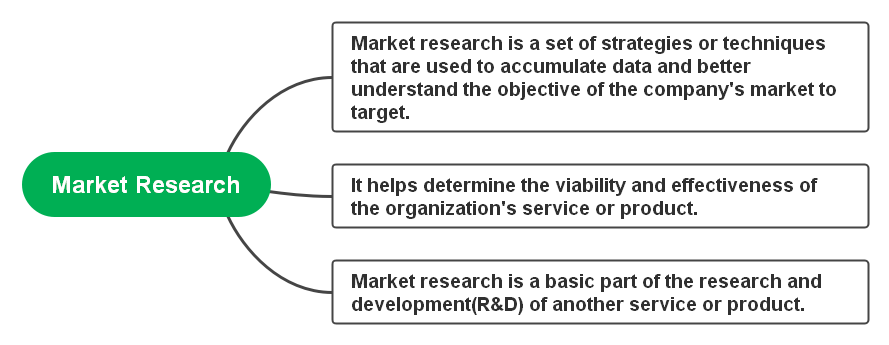Market Research: Simple Guide with Mind Map Examples
In today's time, consumers have a great deal of power. They can research your service or product and settle on choices whether to buy it or not entirely all alone. In addition, instead of conversing with one of your salespeople, they are bound to request references from individuals from their organizations or read online surveys. In light of this, have you adjusted your marketing technique to supplement the manner in which the present buyers' research, shop, and purchase? To do precisely that, you should have a profound understanding of who your purchasers are, your particular market, and what impacts the choices of the buyer and behavioral shift of your intended targeted audience. Regardless of whether you are new to market research, this article will give you a plan for directing thorough research of your competition, market, and target.
Introduction
Organizations use market research to check the viability of another service or product by discussing it with a potential consumer directly. With market research, organizations can sort out their objective market and get feedback and opinions from customers progressively in real-time. The research incorporates focus groups, surveys, and tests.
What Is Market Research?
Market research or marketing research is a set of strategies or techniques that are used to accumulate data and better understand the objective of the company's market to target. Organizations utilize this data to plan, improve the consumer experience, create a message for marketing, and better products that pull in quality leads, potential consumers and improve the rate of conversions. It helps determine how viable, suitable, and effective the organization's service or product would be and additionally is among the targeted audience.
This sort of research tends to be done through product surveys, focused groups, and product testing. The subjects to be tested are generally remunerated with the samples of the products or potentially pay a small amount for their time. The basic part of research and development (R&D) for other services and products is market research.

Purpose of Market Research
The goal for market research is to consider the associated market with the precise service or product to determine how the target audience or general public will get it. This can include knowledge and information gathering with the end goal of product differentiation and market segmentation, which can be utilized to adapt the efforts of advertising or figure out what highlights are viewed as a need to the customer.
There exists a number of tasks that a business should participate and get involved in, in order to complete the market research. It needs to assemble information dependent on the market area being analyzed. The business needs to break down and decipher the information resulting in order to decide the presence of any relevant points of data and patterns that it can use in the process of decision making.

Why Is Market Research Important?
Without research, it is difficult to know your audience and understand what they need. You cannot run a business without knowing your target audience and their concerns and expectations. Of course, you may have an idea about what their identity or need is, yet you should consider yourself to involve deeper if you wish to win them. Here are a few points as to why market research matters and why it is valuable.
- The Research Help You Find The 'Why'
User analytics or big data can help you know about what the consumers or users at doing at scale, but the market research helps you know what they are thinking of and why are they prefer doing what they are doing.
- It Helps Keep You Updated
Market research helps you beat the trends, practices, and assumptions. That is by listening to your consumers or target audience's demands, choice, and wants, you can not only stay updated with the trends and fulfill the expectation but you can also become a trendsetter for the industry.
- Know Your Audience
If you are not into improving the experience of your consumers, you are likely to lose your clients to somebody who does care about their needs and wants.

Common Market Research Strategies
There are loads of various ways you could direct market research and gather client information, yet you do not need to restrict yourself to only one research technique. There are four common kinds of market research strategies, including interviews, surveys, observation, and focused groups.
ObservationDuring a client session of observation, somebody from the organization makes sure to consistently make notes while they watch the consumer or user draw in and engage with their item or a comparative item from the competitor.
Observation session market research strategy is one of the most powerful and clever techniques. Fly-on-the-wall perception is a great choice to focus gatherings. It is more affordable; however, you will see individuals engage with your item in a setting that is natural and without affecting one another. The drawback is that you cannot get inside their heads, so observation session is no trade for client interviews and surveys.
Focus GroupFocus groups unite a painstakingly chosen group of individuals who fit an organization's market to target. A prepared facilitator drives a discussion encompassing the marketing message, product, and additionally the user experience to acquire further bits of knowledge.
InterviewsMeetings are a one-on-one discussion with individuals from your market that you are targeting. Nothing is better than the in-person meeting in order to dive deep, however in case that a face-to-face meeting is not possible, video conferencing is a strong subsequent alternate.
SurveysIn surveys you are supposed to ask clients via a short series of open-or-closed-ended questions, which can be conveyed as an on-screen poll or by means of email.

Conclusion:
Market research is an important tool in assisting organizations with understanding what their target customers need, create items that the consumers will utilize, and keep an upper hand over their competitors in their industry.


